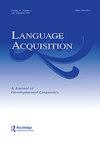The influence of cognitive abilities on article choice and scrambling performance in Dutch-speaking children with autism
IF 1.3
3区 文学
0 LANGUAGE & LINGUISTICS
引用次数: 7
Abstract
ABSTRACT This study addresses the question as to what cognitive abilities influence performance on article choice and direct object scrambling in high-functioning Dutch-speaking children with Autism Spectrum Disorder (ASD). Schaeffer (2016/2018) shows that a group of 27 high-functioning Dutch-speaking children with ASD, aged 5–14, overgenerates the indefinite article, and fails to scramble significantly more often than TD age-mates. As article choice, direct object scrambling, and false belief are all hypothesized to rely on perspective taking, we first predict a correlation between scores on article choice, direct object scrambling, and false belief. Furthermore, hypothesizing that article choice and direct object scrambling require holding the previous discourse in mind, it is predicted that memory abilities predict article choice and direct object scrambling performance. Surprisingly, the results reveal no correlation between article choice, direct object scrambling, and false belief. Moreover, no influence of working memory was found, nor of inhibition or morphosyntax, which were also tested. Phonological memory turns out to be the only cognitive ability that predicts scores on direct object scrambling (but not on article choice!). It is suggested that another cognitive skill may contribute to article choice and/or direct object scrambling, namely, central coherence.认知能力对荷兰语自闭症儿童文章选择和争先恐后表现的影响
摘要本研究探讨了认知能力如何影响患有自闭症谱系障碍(ASD)的高功能荷兰语儿童在文章选择和直接对象争夺方面的表现。Schaeffer(2016/2018)表明,一组27名5-14岁的患有自闭症谱系障碍的高功能荷兰语儿童过度产生不定冠词,并且比TD年龄段的同伴更频繁地争抢。由于文章选择、直接对象争夺和错误信念都被假设依赖于视角选取,我们首先预测了文章选择、间接对象争夺和虚假信念得分之间的相关性。此外,假设文章选择和直接对象置乱需要记住先前的话语,预测记忆能力可以预测文章选择和对象置乱的表现。令人惊讶的是,研究结果显示,文章选择、直接对象混淆和错误信念之间没有相关性。此外,没有发现工作记忆的影响,也没有发现抑制或形态语法的影响,这也进行了测试。事实证明,语音记忆是唯一能预测直接宾语混乱得分的认知能力(但不是文章选择!)。有人认为,另一种认知技能可能有助于文章的选择和/或直接的宾语争夺,即中心连贯。
本文章由计算机程序翻译,如有差异,请以英文原文为准。
求助全文
约1分钟内获得全文
求助全文
来源期刊

Language Acquisition
Multiple-
CiteScore
2.30
自引率
8.30%
发文量
20
期刊介绍:
The research published in Language Acquisition: A Journal of Developmental Linguistics makes a clear contribution to linguistic theory by increasing our understanding of how language is acquired. The journal focuses on the acquisition of syntax, semantics, phonology, and morphology, and considers theoretical, experimental, and computational perspectives. Coverage includes solutions to the logical problem of language acquisition, as it arises for particular grammatical proposals; discussion of acquisition data relevant to current linguistic questions; and perspectives derived from theory-driven studies of second language acquisition, language-impaired speakers, and other domains of cognition.
 求助内容:
求助内容: 应助结果提醒方式:
应助结果提醒方式:


